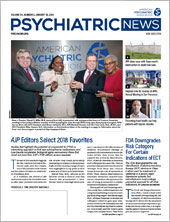If you joined APA before 1995, you probably remember when the Institute on Psychiatric Services (IPS) was known as the Institute on Hospital and Community Psychiatry. In 2015, it was renamed IPS: The Mental Health Services conference. Regardless of its name, since its beginnings 70 years ago, it has been the meeting where many APA members who work primarily in publicly funded settings connect with their colleagues, gain the latest knowledge and skills to maintain the highest standards of care, and are inspired to continue doing this work and encourage others to join them.
More than just a feel-good meeting, the IPS has, from its inception, been driven by the core values and mission of APA: “to improve access to and quality of psychiatric services” for “individuals with mental illnesses, including substance use disorders, and their families.” Held each fall, it is designed to be a smaller, intimate experience different from the Annual Meeting and serves as APA’s tangible commitment to supporting the work of psychiatrists on the frontline who are committed to ensuring that as many people as possible, regardless of their circumstances, have access to high-quality mental health care.
This commitment to community psychiatry is also apparent in other areas of the organization, notably the $14.2 million grant from the Substance Abuse and Mental Health Services Administration (SAMHSA) to create the Clinical Support System for Serious Mental Illness (
Psychiatric News, July 27, 2018). We have also increased our focus on training and developing public sector psychiatrists, thanks to APA’s taking the lead in the SAMHSA-funded Recovery to Practice Training Curriculum. Today, community psychiatry is being called “the third psychiatric revolution,” and as this nation’s oldest medical association with roots deeply embedded in providing public-sector care, APA is uniquely positioned to provide the support and educational programs that community psychiatrists need to continue their work and move it forward.
Unfortunately, the IPS has floundered over the last few years because of increasing expenses associated with hosting meetings in major cities and decreasing revenue from registration and exhibitors. As a part of our fiduciary responsibility to the organization, Dr. Anita Everett appointed and I have continued the IPS Strategic Planning Work Group, charged with conducting a situational analysis of the meeting (examining its structure, duration, location, and timing) and making recommendations for enriching the meeting over the next three to five years.
As with other areas of the Association, we are looking at ways to improve operations while providing high-quality member benefits to our growing organization. The work group
submitted its initial recommendations to the Board of Trustees at its December 2018 meeting, and after accepting the work group’s initial report, the Board requested that the work group continue and work with APA staff to evaluate the feasibility of a revised format for future IPS meetings. They will report back to the Board in March. The Board also voted to not hold the IPS in 2020 (the APA administration reported that there were some challenges with contracting with a hotel for the 2020 meeting), and the Board felt that suspending the meeting for one year would give APA additional time to examine the feasibility of the meeting.
Finally, APA leaders were asked to host a town hall meeting at APA’s 2019 Annual Meeting in San Francisco to further discuss the future of the IPS. Primary issues will include the value of a smaller meeting, opportunities to change the program format, and possible strategies for increasing the attendance of APA members as well as more of our partners in the public sector. The preliminary report presented to the Board last month indicated that approximately 50 percent of IPS attendees also attend the Annual Meeting, so we’re hoping that members who value the IPS will come to the town hall.
It is important that we continue to have high expectations for this meeting, and it is equally important that we establish realistic approaches to meeting both our fiduciary and professional-development responsibilities. Losing sight of either could change the course of our profession in ways that impact our service, training, and research goals for generations to come. As always, we look forward to hearing what you think! More information on the town hall will appear in a future issue of Psychiatric News. ■

